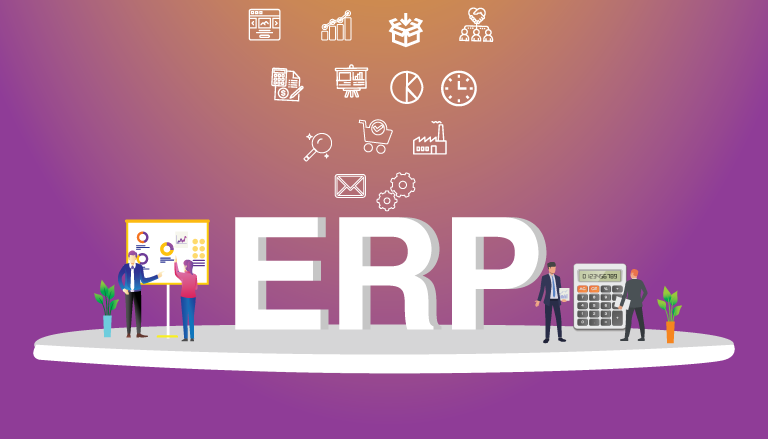5 Reasons to Start Using an Enterprise Resource Planning (ERP) System
ERP systems are vital for enhancing company performance by streamlining operations and integrating processes. This article highlights five reasons why adopting an ERP system is essential for business success, including operational efficiency enhancement, improved decision-making, optimized inventory and supply chain management, enhanced customer experience, and heightened security.

Introduction:
Enterprise Resource Planning (ERP) systems are considered one of the most important technological tools that contribute to enhancing the performance of companies and improving the efficiency of daily operations. The use of an ERP system is a critical strategic step for companies aspiring to achieve sustainable success in the modern business environment. It enables organizations to effectively manage and integrate various internal processes, thereby improving customer experience and facilitating better decision-making. In this article, we will take a look at five key reasons that make the use of an Enterprise Resource Planning system vital for business success. We will explore how an ERP system can enhance operational efficiency, improve decision-making, optimize inventory and supply chain management, enhance customer experience, as well as improve security and information protection.

Improving Operational Efficiency:
Enhancing operational efficiency is a primary goal that companies strive for to ensure sustainability and excellence in the competitive business market. Enterprise Resource Planning (ERP) systems are a vital element in achieving this goal, offering a range of benefits that significantly contribute to improving internal operational efficiency.
Benefits of Improving Operational Efficiency with ERP System:
- Process Integration:
ERP systems integrate various enterprise processes, such as planning, manufacturing, sales, and human resources. This integration reduces redundancy and enhances communication between different departments, greatly improving workflow organization.
- Enhancing Decision-Making Processes:
ERP systems provide accurate and comprehensive data, assisting in improving decision-making capabilities. Leaders and managers can rely on detailed and up-to-date reports to make better strategic and tactical decisions.
- Increasing Resource Utilization Efficiency:
ERP systems enhance resource utilization by providing a comprehensive view of enterprise operations. Companies can analyze resource consumption and optimize planning to meet production needs more efficiently.
- Reducing Errors and Losses:
With the use of an ERP system, human errors and losses can be minimized as data is automatically updated and standardized in one central location. This reduces the likelihood of manual errors and improves data accuracy.
- Accelerating Workflow:
ERP systems reduce the complexity of routine processes and streamline workflow organization. Employees can access information quickly and efficiently, increasing work productivity and speeding up goal achievement.
By utilizing an ERP system, the power lies in transforming daily operations into integrated and efficient processes, making it a vital investment for companies seeking to improve their efficiency and excel in the ever-evolving business world.

Improving Decision-Making:
When it comes to business success, making informed decisions plays a crucial role. The Enterprise Resource Planning (ERP) system is considered a powerful tool that actively contributes to enhancing an organization's ability to make informed and effective decisions. In this section, we will explore how an ERP system can significantly boost the decision-making process.
Benefits of Improving Decision-Making with ERP System:
- Easy Access to Data:
ERP systems provide a centralized interface that enables users to instantly access comprehensive and accurate data. This facilitates leaders and managers in retrieving the necessary information for making informed decisions promptly.
- Advanced Data Analysis:
ERP systems enhance advanced data analysis, providing detailed reports and visualizations that facilitate a holistic understanding of overall operations. This allows decision-makers to make more intelligent decisions based on precise insights.
- Data Standardization:
The ERP system ensures data standardization from multiple sources, reducing verification and analysis periods. This improves data quality and facilitates its use in decision-making processes.
- Monitoring Effective Performance:
ERP systems can provide real-time dashboards and reports on enterprise performance. Leaders can identify key performance indicators and monitor goal progress, making it easier to make effective tactical decisions.
- Facilitating Strategic Planning:
ERP systems enhance strategic business planning by providing accurate forecasts and data-driven models. This contributes to developing effective strategies for achieving future goals.
By using an ERP system in the decision-making process, it becomes possible to achieve deep insights and a comprehensive understanding of situations, greatly contributing to improving decision quality and increasing management effectiveness.

Improving Inventory and Supply Chain Management:
The process of tracking inventory and managing the supply chain is a vital part of any enterprise's supply chain. The Enterprise Resource Planning (ERP) system enhances these processes by providing effective tools for monitoring inventory and improving supply chain management comprehensively.
Benefits of Improving Inventory and Supply Chain Management with ERP System:
- Enhancing Visibility of Inventory:
The ERP system allows a comprehensive real-time view of inventory status. Users can monitor inventory levels and accurately predict future needs, reducing the chances of shortages or excess stock.
- Improving Storage and Distribution Operations:
ERP systems can enhance the planning and organization of storage and distribution operations. Companies can effectively track inventory movements and optimize resource allocation to better meet customer needs.
- Reducing Storage Costs:
By improving inventory tracking, an ERP system can estimate actual needs and reduce excess storage. This contributes to reducing storage costs and maximizing space utilization.
- Enhancing Consistency in the Supply Chain:
An ERP system can achieve consistency in the supply chain by tracking processes from the source of materials to the distribution point. This improves coordination between different stages and reduces communication gaps.
- Facilitating Supplier Interactions:
An ERP system can improve interactions with suppliers by providing accurate information about inventory and needs. This allows suppliers to adapt effectively to the company's requirements.
By improving inventory tracking and supply chain management, companies can achieve greater efficiency in production and distribution operations. The ERP system makes these processes more transparent and accessible, contributing to improved efficiency and achieving an optimal balance in the supply chain.

Improving Customer Experience:
In the modern business world, enhancing customer experience is considered one of the top priorities to ensure the success and continuity of companies. The Enterprise Resource Planning (ERP) system plays an effective role in this context, providing innovative tools to enhance businesses' interaction with their customers.
Benefits of Improving Customer Experience with ERP System:
- Unified Customer Data:
The ERP system allows the unification of customer data from various departments, contributing to creating a comprehensive profile for each customer. Employees can easily access customer information and better understand their needs.
- Improving Order and Delivery Processes:
The ERP system enhances the speed and accuracy of order and delivery processes. Companies can improve access to inventory procedures and provide accurate information about the expected time for product delivery.
- Providing Personalized Customer Service:
An ERP system can provide accurate data about customer preferences and their previous purchase records. Companies can customize their services based on this information, enhancing the customer experience and building lasting relationships.
- Enhancing Communication and Feedback:
The ERP system provides a centralized database that allows different teams to exchange information seamlessly. This enables teams to interact better with customers and respond to their inquiries more quickly.
- Offering Customer Analytics:
An ERP system can provide reports and analytics on customer interactions with products or services. Companies can evaluate performance and identify areas for improvement to increase customer satisfaction.
By using an ERP system to improve customer experience, companies can build strong relationships with their customers, achieve their satisfaction, and consequently, enhance customer loyalty and achieve sustainable growth in the market.

Improving Security and Information Protection:
With the rapid advancement in the age of technology, safeguarding information has become crucial for companies and organizations. The Enterprise Resource Planning (ERP) system plays a pivotal role in enhancing security levels and ensuring information integrity. In this segment, we will outline how an ERP system can enhance security and guarantee information safety.
Benefits of Improving Security and Information Protection with ERP System:
- Advanced Access Management:
The ERP system allows precise identification of permissions and access for users. This enhances security by preventing unauthorized access to sensitive information.
- Data Encryption:
An ERP system can encrypt stored and transmitted data, increasing its protection level. This minimizes the risks of unauthorized access and strengthens the security barrier for sensitive information.
- Activity Monitoring and Auditing:
The ERP system provides activity monitoring and auditing features, allowing organizations to track and log all activities. This contributes to detecting any unusual movement or unauthorized activity.
- Enhancing Data Integrity:
An ERP system can improve data integrity by providing effective backup measures. Integration with backup and data recovery systems helps maintain the integrity of information.
- Regular Security Updates:
ERP system providers can offer periodic security updates, allowing for the correction of vulnerabilities and enhancing the protection level. This helps prevent new security threats and ensures the continuity of protection.
By integrating an ERP system into the security infrastructure, companies can maintain the integrity and protection of their information from increasing security threats. Improving security and information protection is an integral part of the overall security strategy, aiming to ensure the stability and safety of operational processes.

Conclusion:
In conclusion of this comprehensive exploration of the benefits of the Enterprise Resource Planning (ERP) system, we find five compelling reasons to initiate the use of this vital system. We began with the first enhancement, "Improving Operational Efficiency," where the ERP system contributes to unifying and enhancing internal company processes. This was followed by "Improving Decision-Making," where the system provides accurate data and detailed reports to enhance decision-making processes.
Next, we addressed "Improving Inventory Tracking and Supply," where the ERP system allows for an effective view of inventory and improves planning and distribution. Following that, we discussed "Improving Customer Experience," where the system offers personalized and customized services for customers. Finally, we reviewed "Enhancing Security and Information Protection," where the ERP system works to provide effective security and protection for sensitive information.
However, the I-Zone system offered by CodeZone Software presents a comprehensive and achieved solution for all these aforementioned benefits and more. I-Zone is a unique and comprehensive solution that combines operational efficiency, precise decision-making, excellent inventory tracking and supply management, superior customer experience, and significant security and protection. Adopting I-Zone system is a smart step towards achieving excellence in resource management and improving operational performance, contributing to the company's success and better achievement of its goals.


